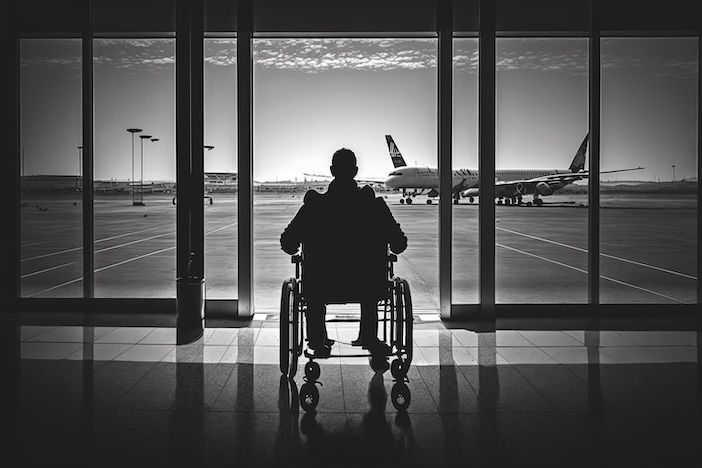The US Department of Transportation (DOT) has imposed a US$50 million penalty against American Airlines (American) for what it says are “numerous serious violations” of the laws protecting airline passengers with disabilities between 2019 and 2023.
According to the DOT, its investigation into American Airlines uncovered cases of unsafe physical assistance that, at times, resulted in injuries and undignified treatment of wheelchair users, in addition to repeated failures to provide prompt wheelchair assistance. The DOT also found that the airline had mishandled thousands of wheelchairs by damaging them or delaying their return to their owners, leaving travellers without the device they need for mobility.
‘These problems are not unique to American Airlines, and allegations of wheelchair mishandling and inadequate wheelchair assistance are far too common,’ reads a statement issued by the US DOT. ‘DOT has active investigations into similar violations at other US airlines. Today’s enforcement action is 25-times larger than DOT’s previous largest airline penalty for violations of disability protections and sets a new precedent for how DOT will enforce against such violations going forward’.
“The era of tolerating poor treatment of airline passengers with disabilities is over,” said Pete Buttigieg, the US Transportation Secretary. “With this penalty, we are setting a new standard of accountability for airlines that violate the civil rights of passengers with disabilities. By setting penalties at levels beyond a mere cost of doing business for airlines, we’re aiming to change how the industry behaves and prevent these kinds of abuses from happening in the first place.”
Airline obligations to disabled travellers
US DOT regulations require airlines to return wheelchairs and other mobility devices in a timely manner, and in the same condition in which they were received. Passengers with disabilities should also be given prompt assistance to get on and off aircraft, including moving within airports. The DOT also considers violations of these regulations for those travelling on domestic flights in the USA to be a failure to provide safe and adequate service. In July 2022, the DOT published the first Airline Passengers with Disabilities Bill of Rights to help travellers understand their entitlements when flying.
In its investigation of American Airlines, the DOT reviewed complaints against the airline involving allegations of inadequate wheelchair assistance, including three formal complaints filed by Paralyzed Veterans of America alleging similar issues. The DOT also investigated American Airlines’ handling of wheelchairs between 2019 and 2023, including an incident captured on video at the Miami International Airport of the airline’s personnel mishandling a wheelchair by dropping it down a baggage ramp.
The DOT says that American had been one of the worst performers among US airlines in terms of both the total number of wheelchair and scooter mishandling claims and the rate of mishandling claims, and that the DOT’s investigation revealed a significant number of violations.
The US Department of Justice’s Civil Rights Division provided assistance and advice to the DOT during the negotiation of this penalty.
“We applaud the Department of Transportation’s landmark civil rights agreement to uphold the dignity of passengers with disabilities in air travel,” said Kristen Clarke, Assistant Attorney General for Civil Rights. “The Department of Justice is committed to ensuring that people with disabilities have the freedom to travel independently. Travellers with disabilities must be confident they will receive timely assistance and arrive safely, with their mobility aids and assistive devices intact.”
The reasoning behind the record penalty
As part of the US$50 million penalty, American Airlines will be required to pay a US$25 million fine to the US Treasury. In addition, American Airlines will be credited US$25 million towards the total penalty for investments in equipment to reduce incidents of wheelchair damage, investments in a system-wide wheelchair tagging system to reduce incidents of wheelchair delay, deployment of hub control centre employees to coordinate wheelchair handling on a systemwide basis at large airports, and compensation for affected passengers during the timeframe covered by the DOT’s investigation. If these expenditures are not made, the additional US$25 million will be paid as a fine to the US Treasury.
The full consent order is available here.
Under the leadership of Secretary Buttigieg, the DOT has sought higher penalties that go beyond the cost of doing business to ensure that airlines are help properly accountable for the mistreatment of passengers, and sufficient to change airline behaviour. Between 1996 and 2020, the DOT collectively issued US$71 million in total penalties against airlines for consumer protection and civil rights violations.
During the Biden-Harris Administration, the DOT has tripled that amount, issuing nearly US$225 million in penalties, including the following:
- The DOT’s largest-ever airline penalty: $140 million against Southwest Airlines for its 2022 meltdown during Winter Storm Elliot.
- DOT’s largest airline penalty for religious discrimination: $4 million against Lufthansa for denying boarding to 128 Jewish passengers.
- DOT’s largest airline penalty for extreme tarmac delays: $4.1 million against American Airlines for dozens of instances where passengers were kept on the tarmac for three or more hours.
Under the Biden-Harris Administration, the DOT has also taken historic action to improve transportation for people with disabilities in air travel:
- It has published the Airline Passengers with Disabilities Bill of Rights, which describes the fundamental rights of air travellers with disabilities under the Air Carrier Access Act and its implementing regulation.
- Established a final rule on accessible lavatories on aircraft, requiring airlines to make lavatories on new single-aisle aircraft large enough to permit a passenger with a disability and an attendant to approach, enter, and manoeuvre within as necessary to use the aircraft lavatory.
- Funded accessibility improvements at airports through the Bipartisan Infrastructure Law Airport Terminals Program. Nearly 150 projects funded under this programme are improving airport terminal access for people with disabilities and ensuring compliance with the Americans with Disabilities Act.
- Proposed a new rule to ensure safe and dignified accommodations for air travellers with disabilities using wheelchairs. The proposed rule would set new standards for assistance, mandate enhanced training for airline employees and contractors who physically assist passengers with disabilities and handle passengers’ wheelchairs, and outline actions that airlines must take to protect passengers when a wheelchair is damaged during transport. DOT is currently working towards issuing a final rule.
A landmark moment for disability campaigners
The work of the US DOT is good news for the safety of disabled travellers, and further developments could be on the horizon. For example, All Wheels Up (AWU), a non-profit organisation, is dedicated to funding research for wheelchair spots on commercial aircraft. AWU recently reported that its campaign has been heard and is being acted upon, with the FAA indicating it expects to make a recommendation on installing wheelchair tiedown and restraint systems on airplanes by the end of 2025. AWU believes the fine against American Airlines marks ‘a pivotal moment in advocating for accessible air travel’.
Michele Erwin, president and founder of AWU, said that while it is unfortunate that rule violations had to occur in order for the record penalty to be imposed, the US DOT’s findings present a valuable opportunity for airlines to revise their internal processes and programmes to better meet the needs of all passengers, including those with disabilities.
“Change is happening,” said Erwin. “For 15 years, we have advocated tirelessly for wheelchair spots on commercial aircraft. This significant penalty, along with the initiation of federal testing to eventually accommodate wheelchairs on planes, clearly indicates that we are moving in the right direction.”





